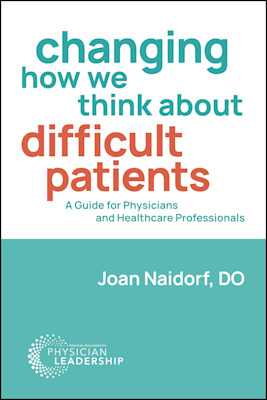Changing How We Think about Difficult Patients: A Guide for Physicians and Healthcare Professionals
Paperback
Physicians enter their professions with the highest of hopes and ideals for compassionate and efficient patient care. Along the way, however, recurring problems arise in their interactions with some patients that lead physicians to label them as “difficult.” Some studies indicate that physicians identify 15% or more of their patients as “difficult.” The negative feelings that physicians have toward these patients may lead to frustration, cynicism. and burnout.
Changing How We Think about Difficult Patients uses a multi-tiered approach to bring awareness to the difficult patient conundrum, then introduces simple, actionable tools that every physician, nurse, and caregiver can use to change their mindset about the patients who challenge them. Positive thoughts lead to more positive feelings and more effective treatments and results for patients. They also lead to more satisfaction and decreased feelings of burnout in healthcare professionals.
How does this book give you an advantage?
Caring for difficult patients poses a tremendous challenge for physicians, nurses, and clinical practitioners. It may contribute significantly to feelings of burnout, including feelings of exhaustion, cynicism, and lost sense of purpose. In response, Dr. Naidorf offers a pragmatic approach to accepting patients the way they are, then provides strategies for providers to find more happiness and satisfaction in their interactions with even the most challenging patients and families.
Here are just some of the topics the author discusses in detail:
What Makes a ”Good” Patient?
Four Core Ethical Principles of the Clinician-Patient Relationship
The Four Models of the Physician-Patient Relationship
What Challenges Anybody with Illness or Injury?
How “Good” Patients Handle the Challenges of Illness and Injury
Six Common Reactions to Illness and Hospitalization
On “Taking Care of the Hateful Patient”
Standards for Medical Ethics
De-escalation Strategies
Cultural, Structural, and Language Issues
Types of Patients Who Tend to Challenge Us
The Think-Feel-Act Cycle
Recognizing Our Preconceived Thoughts
Three Common Thought Distortions About Patients
Asking Useful Questions
Getting Out of the Victim Mentality
Guiding our Thoughts Through a Common Scenario
Show Compassion, Feel Compassion
If you’re a healthcare provider or caregiver, Changing How We Think about Difficult Patients will give you the benefit of understanding your most challenging patients, and a roadmap to positively changing your mindset and actions to better deliver care and compassion for all.
Joan Naidorf, DO, is a board-certified emergency physician trained at the Philadelphia College of Osteopathic Medicine and Einstein Medical Center Philadelphia. After growing up in Highland Park, New Jersey, she obtained her undergraduate degree at the University of Virginia. She practiced for nearly 30 years in the busy emergency departments of Inova Alexandria Hospital and Fort Belvoir Community Hospital in Virginia.
As an author and speaker, she has been sharing important ideas with students, residents, and practicing physicians through various online and direct engagements. She was recently appointed to the editorial advisory board of The DO magazine.
Her proudest accomplishment has been raising three compassionate and intelligent children alongside Toby, her devoted husband. Toby supplies many stories of the patients who challenge him from his busy gastroenterology practice. In her spare time, Dr. Naidorf enjoys reading, traveling, playing tennis, and walking with Dolly, the miniature poodle.


